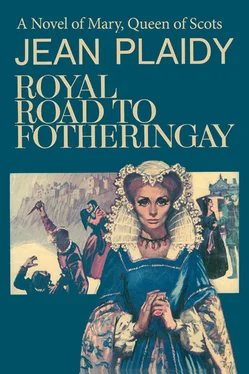She believed him. He was so young, so naïve and, as she was, a stranger to passion.
There was one unfortunate incident which occurred to mar the joy of those days.
It was brought about through the Borderer, Lord Bothwell. He had given up the post for which he had so earnestly begged, that of Captain of the Scottish Guard in France, and had come back to Scotland. He now sent a messenger to the Queen, begging her to grant permission for him to return to the Court.
“And why should he not come back to Court?” asked Mary. “He was imprisoned for implication with Arran, but now we all know that Arran was mad. We have been unfair to Bothwell.”
Her brother Moray, who was now becoming very uneasy indeed about her relationship with Darnley, assured her that it would be the utmost folly to bring Bothwell back to Court.
“The man is a born troublemaker,” he said. “He sows discord. Scotland has been a more peaceful place without him.”
But the Queen was no longer to be dominated thus. She made her own decisions—with the help of Rizzio; and although she deplored the conduct of the Borderer, there was something in his character which appealed to her.
“I think I shall grant him the permission he seeks,” she said.
Moray was furious. He had loved his sister when she followed his advice and allowed him to rule Scotland; he could come near to hating her now, for it seemed to him that she was fast becoming his enemy. His resentment flared up against her. Why should she—a foolish lass—wear the crown when he, their father’s son, was far more suitable to do so? The incredibly bad luck which had attended his birth was a chafing sore that ate into his character, corroding it, destroying his finer qualities, breeding within him a treacherous determination to take the power from his sisters hands.
He would not have Bothwell back at Court. Bothwell was his enemy. Bothwell might have discovered that he had tried to have him poisoned; clearly there was scarcely room in Scotland for Bothwell and Moray.
But to keep Bothwell out of Scotland was not so difficult to accomplish after all, for the rogue, Dandie Pringle—now dismissed from Bothwell’s service and living in Scotland—was the very man to help in this.
Moray commanded him to come to Edinburgh and had him brought before the Queen.
“Before Your Majesty recalls Lord Bothwell,” said Moray, “I thought you might care to hear the testimony of this man.”
“Who is this man?” asked Mary.
“One who served Bothwell when he was in France and knows something of his private life. He will tell you that the Hepburn is one of the greatest libertines in Scotland.”
“There are many libertines in Scotland, great and small. Should one more make so much difference?”
“No, Madam,” said James, “it should not. But this man is more than a libertine. He has spoken cruel slander against persons of high degree.”
“You, brother?”
“Perhaps, my dear sister, but I have not heard of it. I meant against you.”
“What has he said?”
“I have brought Pringle here to tell you how he spoke of you before his servants.”
“Am I to listen to the tittle-tattle of servants?”
“If it concerns yourself, you undoubtedly should.”
“Bring him in then, and let me hear him.”
Dandie Pringle knelt before the Queen.
“So you served with my Lord Bothwell in France?”
“Yes, Your Majesty.”
“And he spoke often of me in your hearing?”
“Not often, Your Majesty, but now and then.”
“And he spoke ill of me?”
“He did, Your Majesty.”
“What said he?”
“Among other things that you and the Queen of England would not make one honest woman between you. He said that the Queen of England had for paramour Lord Robert Dudley, but that if Your Majesty had taken any other than the Cardinal, your uncle, the matter could have been better endured.”
Mary flushed scarlet with anger. “Take this man away!” she cried. “How dare he utter such wicked slander? How dare he even think such things!”
Moray signed to Pringle to hurry away.
“The man but repeats the words of that rogue,” he said as soon as they were alone.
“It is so… monstrous!”
Mary, overcome with fury and shame that such a thing could be said of her, threw herself into her brother’s arms and wept bitterly.
Moray soothed her. He had won this round. Bothwell would not be allowed to remain in Scotland.
THE SOUNDS of revelry burst forth at intervals from the palace of Holyrood. The Queen had never seemed so healthy, nor so happy. She must have her lover continually beside her; she could not bear to lose sight of him. The pain in her side had not troubled her for weeks; there was a delicate color in her usually pale cheeks, and the sound of her laughter frequently rang through the apartment of Little France.
It was true that clouds were gathering about her, but she refused to notice them. She could not spare time to look at them; she had at last let loose her slumbering passion, and it had overwhelmed her, so powerful was it.
She did not realize that she was betraying herself. She would not listen to David’s warning that Moray knew the state of affairs between herself and Darnley, and would do his utmost to prevent their marriage. Maitland was back from his English embassy; he was anxious that she should marry to please the Queen of England, but Maitland had one other matter on his mind now for there was one marriage which seemed to him of more importance than the Queens. His wife had died and he was courting Flem.
Flem and the Queen were closer than the others now. They were both deeply in love; they shared little jokes together; their mingling laughter filled the apartments. Neither would concern herself with what was unpleasant; they were determined to be happy.
David begged the Queen to heed his warning. Moray was gathering together an army for the purpose, he said, of driving Bothwell from the country. A whole army to drive one man from Scotland when that man had already fled back to France? Why did Moray not disband his army? David knew. He wanted Mary to know too.
But if Mary was reckless, if she was almost submerged in the deep seas of her passion, she had attained an even greater dignity than before. In her love affair with Darnley, she was the leader. She was the Queen; she would protect him from such as Moray who, David said, sought to destroy him. Mary was determined to show all Scotland that she was Queen.
At this time Darnley was confined to his bed with an attack of measles. The Queen was distraught—although he was not seriously ill—and insisted on his staying at Stirling Castle so that she could nurse him herself.
She did not leave the sickroom, and if any had doubted her intentions, they could no longer do so.
John Knox, who had called the godly to witness the black mummeries and wickedness that went on in Holyroodhouse, now commanded his flock to observe that the Queen attended her lover in a most immodest manner in his sickroom.
God, he declared, was recording Mary Stuart’s sins. They should be paid for… every one.
The Queen of England heard the news and publicly declared herself shocked by it. She, being a virgin, she said, could scarcely bear to speak of it. A Queen … in a sickroom… nursing a young man! It was wanton behavior.
“The Queen of England,” said Mary, “protests her virtue continually. It is understandable that she should protect what is left to her, for that virtue has been much besmirched by rumor.”
Mary did not know that in private the Queen of England exulted at the success of her plan to bring disorder into Scotland. She laughed with Cecil and Dudley at the accounts of Darnley’s good behavior. “Let her wait,” said Elizabeth. “Soon that long lad will begin to show himself in his true colors, once let him be sure that he has secured the Queen in his net.”
Читать дальше












